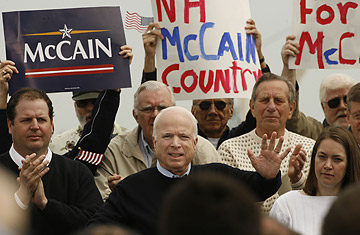
U.S. Sen. John McCain, R-Az., waves to supporters before formally announcing his plans to seek the Republican nomination for President in Portsmouth, N.H., Wednesday, April 25, 2007.
In the wake of disappointing fund-raising returns and even more disappointing slides in the polls, today's event was the first in a string of "official" announcements that will take the Senator through primary states and end in his home state of Arizona. They hope the tour will generate good buzz and, in effect, "press the restart button."
But even today observers in Portsmouth's Prescott Park saw a glimpse of the error screen the campaign currently faces. A modest crowd ("Oh, yeah, I've seen a lot more," said a local connoisseur) milled about while a speaker from a veterans' group tried to gin up some excitement with sheer volume: "Mah-CAIN! Mah-Cain!" he thundered. "We want McCain!"
People covered their ears. He thundered on, inducing more cringing than cheering, before announcing "That's good," and stepping away.
McCain was a few minutes late to the actual speech, where he was introduced in front of an assembly of veterans who held the expected pre-printed signs — "Battle tested," "Veterans for McCain" — and one wholly unexpected one: "Quantum physicist for McCain."
If the campaign was trying to highlight a certain diversity in its platform, the speech fulfilled expectations. He ticked off the full roster of issues: from alternative energy (good!) to Social Security (must be fixed), from the war on terror (necessary) to technology (more of it!). It even featured a catchy refrain that sounded a lot like someone running a campaign against an incumbent rather than, as we used to say, "the presumptive nominee": "That's not good enough for America. And when I'm President, it won't be good enough for me."
But afterwards, all anyone wanted to talk about was Iraq. The scrum of reporters outside the Straight Talk Express was thick and vaguely hostile, tossing repeated questions about the few paragraphs in the speech that mentioned the war. In what might be the single most depressing understatement of the year, McCain noted it "has not gone well." But anyone expecting a shift in policy was disappointed. Rather, he reiterated the points that he had previewed to Jon Stewart the night before — that we made mistakes getting into the war, that we shouldn't make the same mistakes again and well, there was a certain lacuna in his remarks. He did not ask for more time for the surge to "work;" he didn't rail against timetables. In fact, as far as solutions, McCain had just as specific ideas about the tax code as he did about Baghdad.
The crowd, however, was receptive to his platform, if a bit skeptical. They applauded in the right places and even offered up one genuinely rousing cheer, when McCain offered up the core of his appeal: "I know how to fight and how to make peace. I know who I am and what I want to do."
Prior to the speech, aides talked wistfully about the 2000 run, joking about the grubby clothes and lack of sleep. No doubt, there's a desire to recapture the energy and good will of that underdog campaign. But, as his speech showed, McCain is not restarting so much as retrenching. He knows what he wants to do, and changing his mind is not on the agenda.
